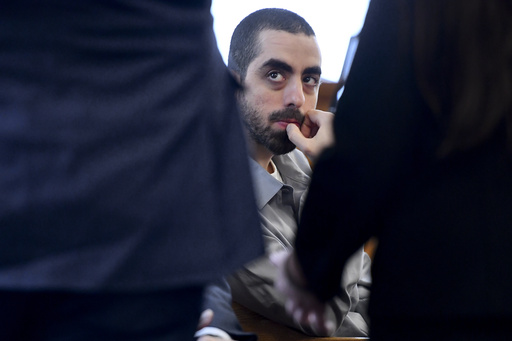New Jersey Man Found Guilty of Attempted Murder in Salman Rushdie Stabbing Case
In a significant ruling on Friday in Mayville, New York, a New Jersey resident was convicted of attempted murder following the 2022 stabbing of acclaimed author Salman Rushdie during a live event. The jury reached its decision in under two hours, also finding Hadi Matar, 27, guilty of assault related to injuries inflicted on another individual present on stage with Rushdie when the attack occurred.
On August 12, 2022, Matar rushed onto the stage just before Rushdie’s planned lecture, stabbing the renowned author over a dozen times in front of an audience. This violent act resulted in Rushdie suffering severe injuries, causing him to lose the eyesight in one of his eyes.
Rushdie served as a pivotal witness throughout the week-long trial, providing vivid accounts of the physical trauma he endured and the lengthy recovery process that followed. When jurors announced their verdict, Matar stood silently, casting his eyes downward, and displayed no overt emotion. As he was escorted out in handcuffs, he quietly expressed the phrase, “Free Palestine,” a recurring statement he has made throughout the trial-related proceedings.
The judge scheduled Matar’s sentencing for April 23, during which he could face a maximum sentence of 25 years in prison, as clarified by District Attorney Jason Schmidt, given the serious nature of the attempted murder charge. Matar’s public defender, Nathaniel Barone, mentioned that the defendant was understandably disheartened by the verdict, but added that he seemed prepared for any outcome.
Following the jury’s conclusion, Schmidt emphasized the strength of the prosecution’s case, attributing much of its success to the compelling video evidence available. “We had multiple angles to present to the jurors,” he remarked, highlighting the clarity of the footage that depicted Matar attacking Rushdie. Schmidt expressed a determination to ensure Matar remains in New York State for a considerable period as part of the repercussions for his crime.
During the closing arguments, assistant public defender Andrew Brautigan challenged the prosecution’s assertions, claiming they failed to demonstrate that Matar harbored a true intent to kill. Schmidt countered, suggesting that the nature of the violent actions—stabbing someone multiple times in vital areas—implicitly signified a potential desire for fatal harm.
In his testimony, Rushdie recounted the harrowing moment when he was attacked by a masked individual, fearing for his life as he was stabbed until nearby audience members intervened. He displayed his injured eye to the jury, further emphasizing the severity of his injuries, which required him to receive extensive medical care, including 17 days in a hospital and subsequent rehabilitation.
As the trial progressed, footage from the Chautauqua Institution’s cameras illustrated the horror of the incident, capturing gasps and screams from attendees. One witness testified that Matar was indeed responsible for the assault which left Rushdie bloodied and on the ground, necessitating urgent medical intervention.
In light of the verdict, PEN America issued a statement applauding the conviction as a significant step toward justice for Rushdie, a celebrated figure in literature. They asserted that the case underscores the grave threats faced by writers who challenge conventional beliefs and expressed a commitment to upholding the freedom to express ideas without fear.
Throughout the trial, Matar displayed moments of levity with his defense team, which opted not to call any witnesses, and he refrained from testifying in his own defense. Barone suggested that had Rushdie not been a prominent cultural figure, Matar might have faced less severe charges.
The case is not over yet; Matar is also facing a separate federal indictment that accuses him of terrorism-related charges linked to motives influenced by a fatwa issued in 1989 against Rushdie. This edict, which called for Rushdie’s death due to perceived blasphemy in his novel “The Satanic Verses,” has been cited as a catalyst for Matar’s motivations.
Rushdie had lived under threats for years but had enjoyed relative freedom after Iran indicated it would not pursue enforcement of the fatwa. A trial for the federal charges is slated to take place in Buffalo.
